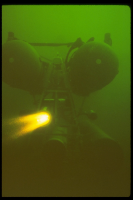 Orca
Orca
 Orca
Orca
The goal of the Orca Project is to create an intelligent, robust, adaptive controller for real-world agents such as autonomous underwater vehicles (AUVs). Aside from being an interesting domain to test AI systems, AUVs have many important real-world uses, including environmental monitoring, climate change research, fisheries management, underwater construction and cable-laying missions, and military applications such as demining harbors.
Orca, the program, is a schema-based reasoner, which means that it represents all of its knowledge as schemas that represent patterns in the world or that are useful for dealing with the world, then brings to bear and merges those schemas at run time in order to carry out its tasks. One type of schema is the procedural schema, or p-schema, which represents knowledge such as plans, scripts, and rules. Another is the contextual schema, or c-schema, which represents problem-solving contexts.
Contextual schemas are the basis of a style of reasoning called context-mediated behavior (CMB). C-schemas represent contexts, which are defined as classes of similar situations. Orca constantly looks for c-schemas matching its current situation so that it can bring to bear knowledge about how to behave in that context. At all times, Orca has a view of its current context comprised of one or more c-schemas that have been retrieved from its long-term memory and merged. This allows the program to automatically behave appropriately for its context. Contextual knowledge informs all facets of Orca’s behavior, including how it handles unanticipated events, chooses procedural schemas, sets behavioral parameters, and focuses attention on goals.
A branch of Orca incorporates a new style kind of planner that, while still being schema-based, pays more attention to how to handle new goals when they arise and how to more intelligently schedule activities. The ACRO planner, by organizing goals in part according to the resources they need, can delay work on goals until appropriate future times and can group related goals together.
Orca is intended to be used both for single agent control and as an intelligent controller for agents involved in multiagent systems. Consequently, the Orca Project has very close ties to another project in our lab, CoDA, which is developing advanced intelligent control techniques for multiagent systems such as autonomous oceanographic sampling networks.
Researchers: Roy Turner, Erik Albert
Funding: Orca has been funded in the past in part by the National Science Foundation (BES-9696044) and the Office of Naval Research (N0001-14-96-1-5009, N0001-14-98-1-0648)
Publications: See the MaineSAIL publications page
History: Work on Orca began at the University of New Hampshire a long time ago (approx. 1990), when Roy was a member of the CS Department and the Marine Systems Engineering Laboratory there. (MSEL has now become AUSI, the Autonomous Undersea Systems Institute, now an independent entity.) When MSEL moved to Northeastern briefly, Roy was associated with them there as a Senior Visiting Scientist. Roy, and Orca, moved to UMaine and created MaineSAIL with his late wife Elise in 1995.
Orca is named for Orcinus orca, the “killer whale”, the most intelligent animal in the ocean. Orcas also live in pods, and so it is appropriate that Orca is also intended to function within a multiagent system.
